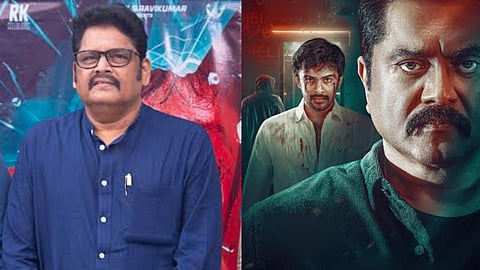

In 1990, after more than a decade in the film industry, a young assistant director finally got the chance to make his first film, from one of the biggest names in the industry: producer RB Choudary. And to everyone’s surprise, the aspiring filmmaker is hesitant to direct the script. His reason was that it was a suspense thriller with violent scenes and dark themes, and he was not sure if the audience of the time would like it. However, after much consideration, he starts working on the film. Puriyaadha Pudhir was a commercial success and launched the career of one of Tamil cinema’s successful and prolific filmmakers, KS Ravikumar.
Now, venturing a third time into film production (after Thenali and Koogle Kuttappa), KS Ravikumar is gearing up to release Hit List, a psychological thriller. Directed by debutants Sooryakathir Kaakkallar and K Karthikeyan, the film introduces actor Vijay Kanishka, son of veteran director Vikraman. When asked if his fears about this violent genre have been quelled over the years, the filmmaker responds, “I wouldn’t have agreed to do this film if my opinion about the genre didn’t evolve. This is what the people want now. They like action. Back then, they wouldn’t even come to watch horror films, let alone thrillers. Even adults used to avoid horror films but now even kids love watching horror. I think it is because of the explosion of content. Now, people are desensitized, they are used to the thrills so they want more.” Ravikumar goes on to spot how the idea of ‘family films’ has evolved into something else. “I think the audience got bored of films revolving entirely around family sentiments. Even a family entertainer like Aranmanai 4 leverages the dark extent of its genre and has violent scenes like decapitation, and people enjoy that. The film also has an old-school mix of commercial elements like family sentiments and romance, comedy, and kid-friendly scenes.”
Lauded as a 'producer's delight', Ravikumar has an acute knowledge of the temporal and financial boundaries of filmmaking. When asked if a director should satisfy their producer even at the cost of sacrificing their original vision, Ravikumar says that a filmmaker should learn to strike a balance. "If you think an actor with a bigger profile would do justice to your character, it is your responsibility to take it up with your producer and convince him. At the same time, you also have to see if you can make up for the additional cost by reducing a scene or removing visual effects. If you save the film, your producer will also be saved. Only those who are honest to their film as well as their producer, will sustain for a long time in the film industry."
On the note of longevity, Ravikumar’s films have enjoyed a longer shelf life than most other films. His Rajinikanth-starrer Muthu, received a re-release last year and was celebrated by the audience with the same furore it enjoyed in 1995. When asked what other title from his filmography he would like to see hit the big screens again, Ravikumar lists down Nattamai, Panchathanthiram, Tenali, Villain, Varalaru, Avvai Shanmugi, Pistha, and Padayappa. He elaborates on his reason, “I think whistle-worthy mass commercial films and comedy films would do well on a re-release,” He then reflects on the absence of out-and-out comedy films in recent films. “It is not that we do not have comedy films but even comedy films have mass elements in them nowadays." The director goes on to reveal that he is currently working on a sequel to his 1997 comedy-drama Pistha. “It will not be a direct continuation of the original film. Rather, it will capture the flavour of the original film, where the hero is seen as a meek submissive person in the first half, and then he dramatically changes in the second half of the film. The screenplay and dialogues of Pistha 2 are completed and I am planning to direct it myself. We are currently on the hunt for actors for the film.”
With an untitled Raghava Lawrence and Ellvin Vinu film also in the pipeline, Ravikumar is excited to get back in the director’s chair. He stresses the importance of being keyed into the audience’s evolving taste. On the insights he learned by observing today's audience, the director shares, “I think the audience have gotten bored of melodrama and sentiments. The emotional scenes need to be toned down. Other than that, the rules have always been the same, you have to keep your audience engaged.”